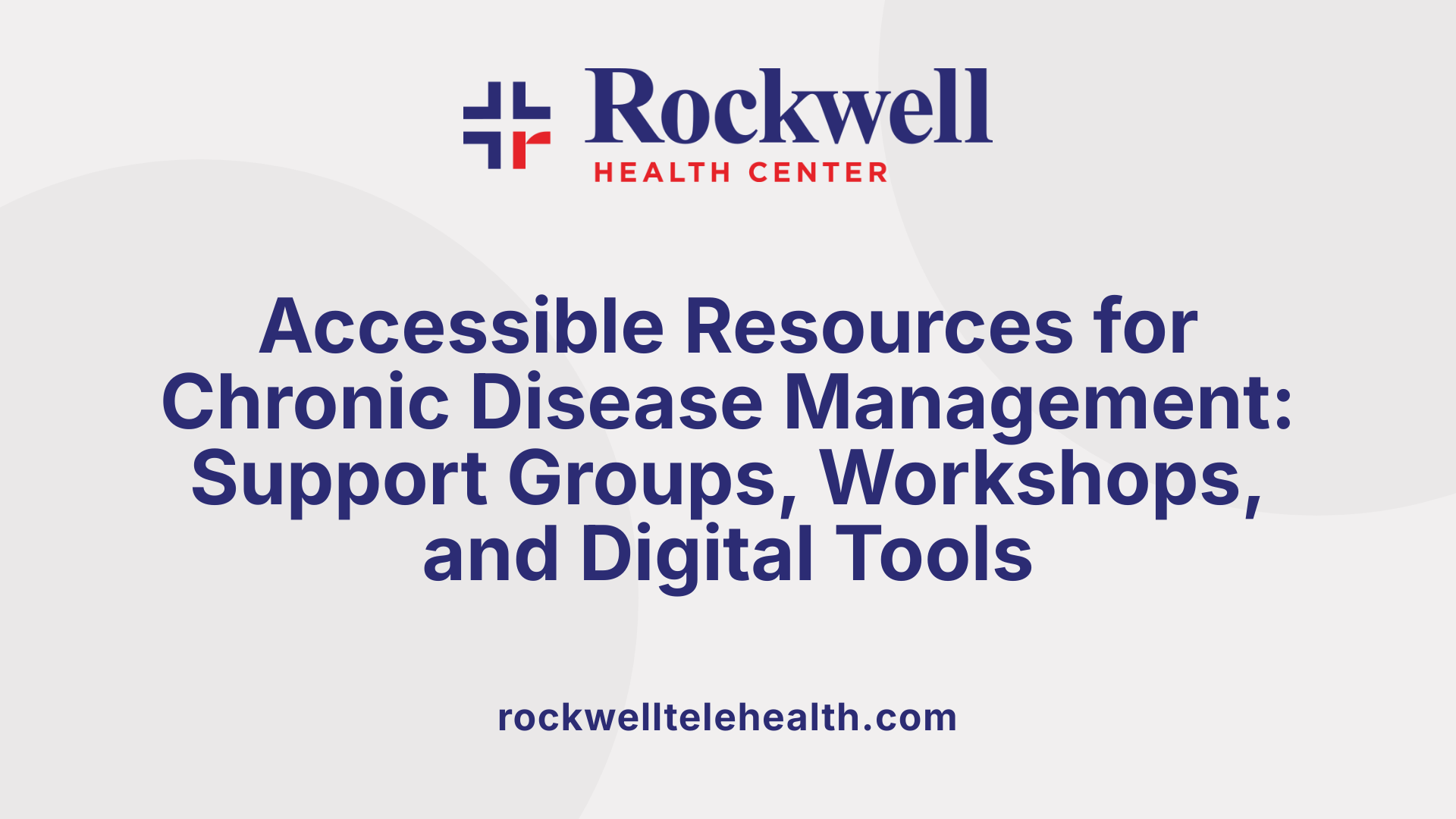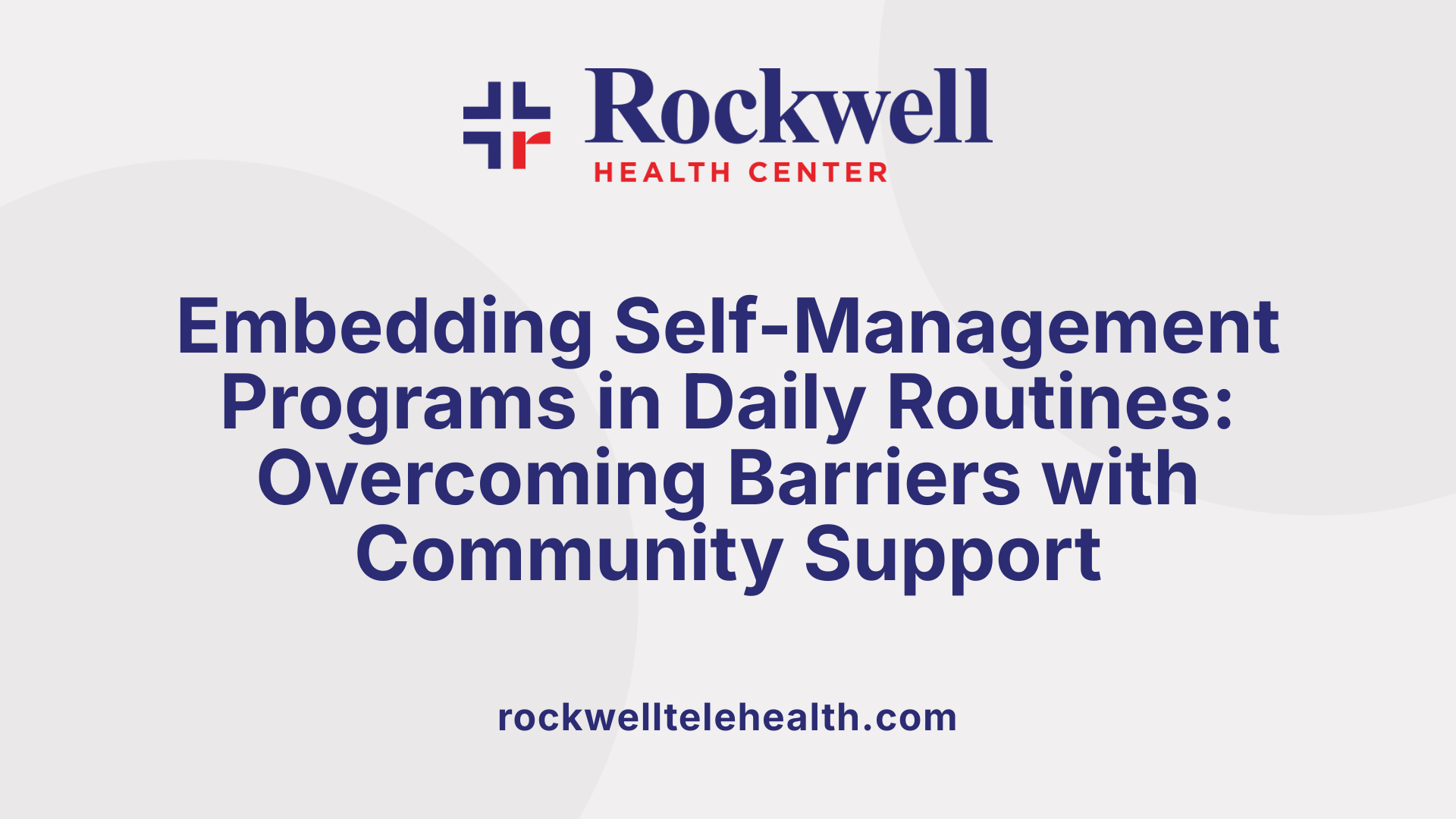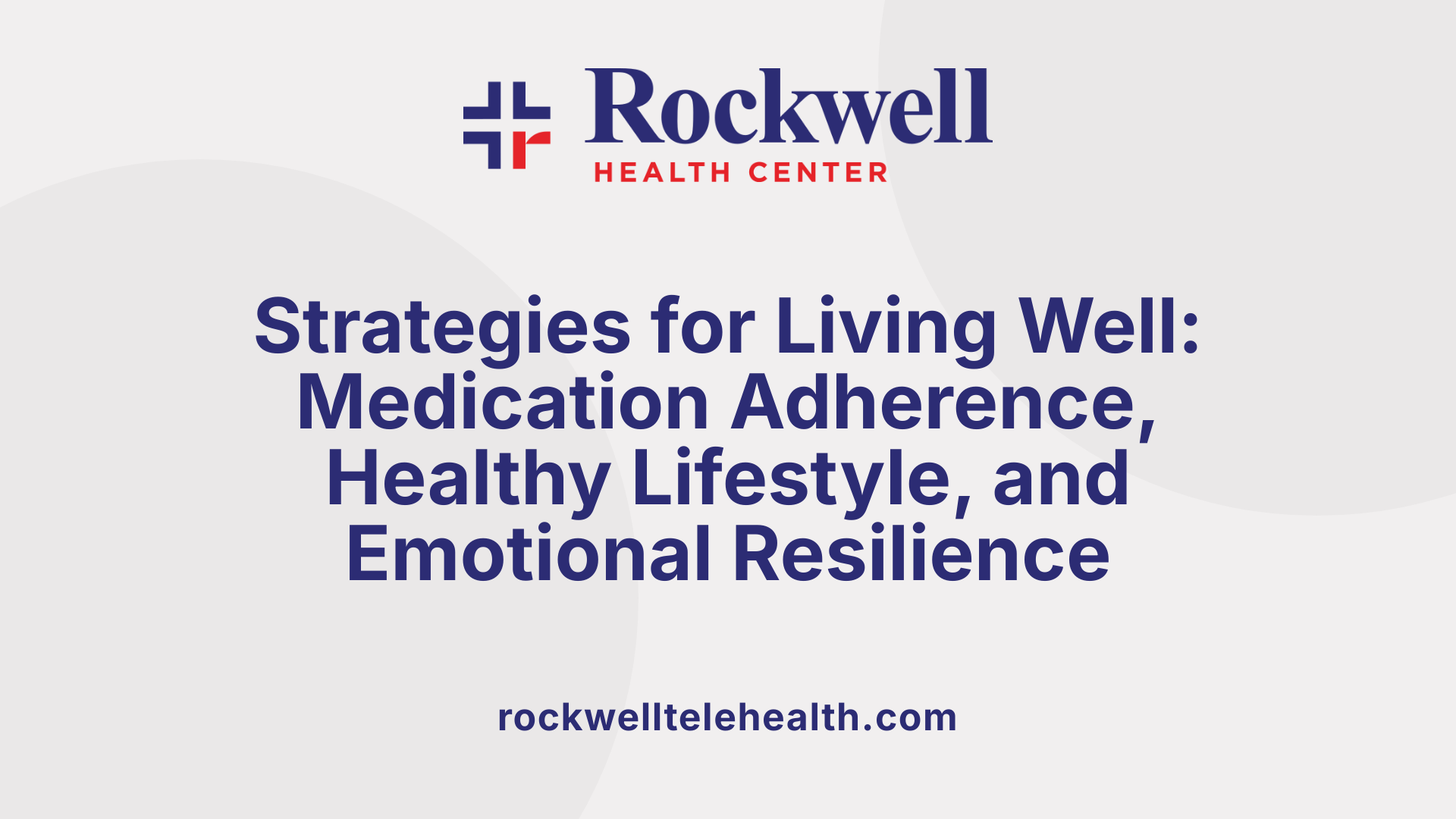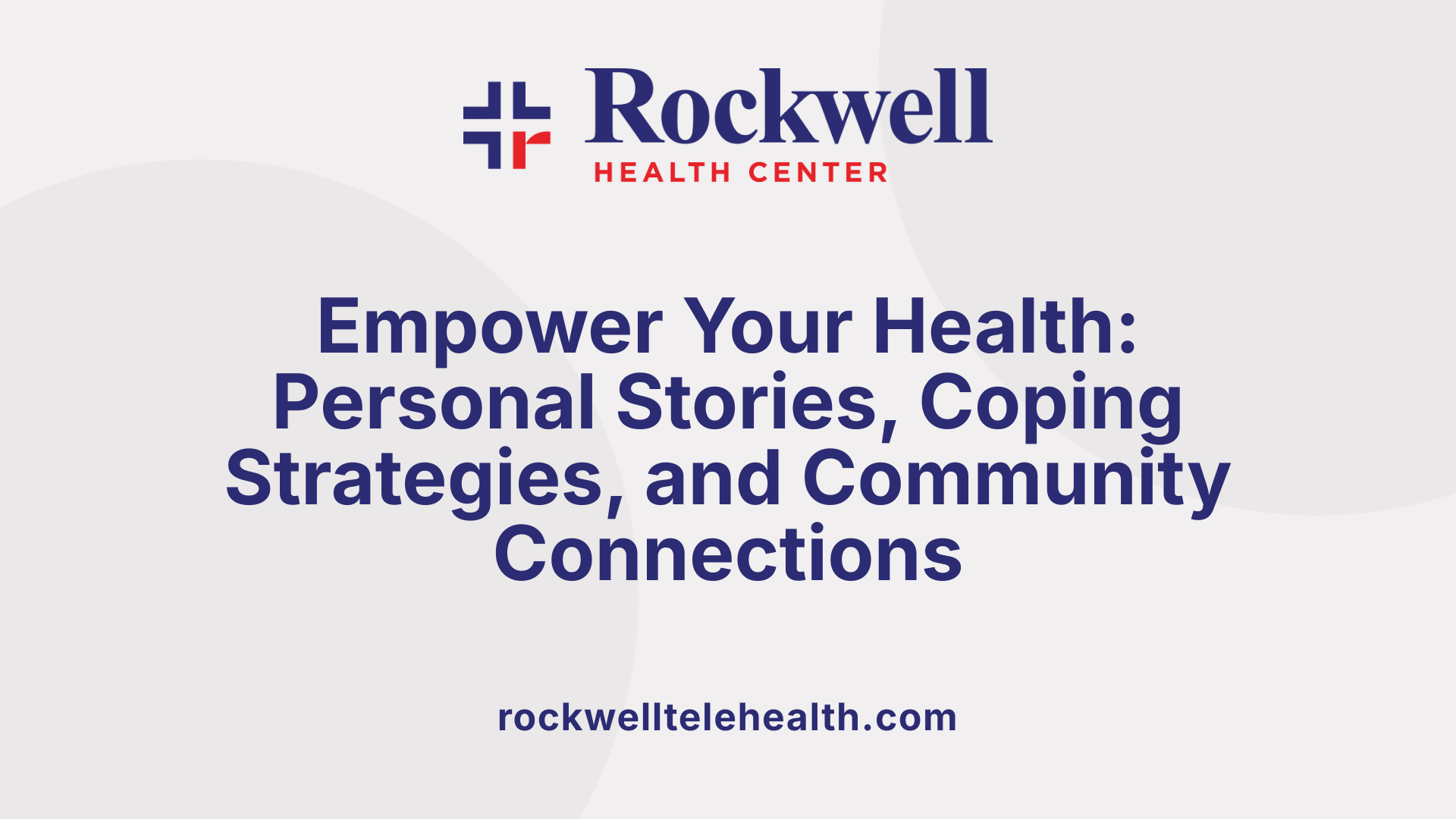Understanding Self-Management and Support Resources for Chronic Illnesses
Managing chronic diseases effectively involves a combination of education, behavioral strategies, emotional support, and community engagement. Evidence-based programs, tailored support resources, and active participation in community initiatives enable individuals to take control of their health while fitting management practices seamlessly into their daily routines. This article explores the structure, benefits, and adaptive strategies of chronic disease support programs that are designed to be accessible, relevant, and practical for diverse populations, including older adults and those in rural areas.
Evidence-Based Self-Management Programs: Foundations and Effectiveness
What are evidence-based self-management programs for chronic diseases?
Evidence-based self-management programs are carefully developed and scientifically tested interventions aimed at helping individuals with chronic illnesses take control of their health. These programs focus on teaching essential skills such as goal setting, decision making, problem-solving, and self-monitoring, which are crucial for managing conditions like diabetes, arthritis, heart disease, and depression.
One well-known example is the Stanford-developed Chronic Disease Self-Management Program (CDSMP). This program provides participants with practical tools to understand and handle their health conditions better. It emphasizes building confidence through education on symptom management, healthy eating, physical activity, medication adherence, and effective communication with healthcare professionals.
Supported by federal agencies like the CDC and the Administration for Community Living, these programs are offered in various formats such as small group workshops, online courses, telehealth sessions, and mailed kits. This flexibility ensures that people in different settings, including rural or underserved areas, can access self-management support.
The science behind these programs shows they are effective in improving physical and emotional health. Participants often report reduced symptoms, increased energy, better medication management, and improved mood. Consistent evidence from research studies demonstrates they can also lower healthcare costs by reducing hospital visits and unnecessary medical care.
Overall, these programs empower patients with knowledge and practical skills, encouraging healthier lifestyles and better management of chronic conditions, leading to improved quality of life.
Community-Based Support Resources and Tailored Interventions

What resources and support options are available for managing chronic illnesses?
Managing chronic illnesses requires a variety of community-based resources and support systems designed to help individuals live healthier, more fulfilling lives. These include support groups, which provide emotional understanding and peer encouragement, and community workshops that teach practical self-management skills.
Many programs are accessible both in person and online, making it easier for participants to engage regardless of their location or mobility. For example, some organizations offer virtual support groups led by licensed mental health professionals that focus on emotional well-being and disease management.
Specialized programs are available for specific conditions such as arthritis, diabetes, and chronic pain. Programs like Better Choices, Better Health or Thrive & Survive are tailored to teach participants how to manage their symptoms through actionable strategies.
Health education events are frequently held in community settings—libraries, churches, healthcare centers, or workplaces—which promote awareness, offer nutritional guidance, and teach physical activity routines. These initiatives often involve partnerships with local organizations and health agencies, including the CDC and the Administration for Community Living.
Resources also extend to digital tools, online forums, and mailed kit programs that make self-management education more accessible. They cover vital topics such as medication management, exercise, nutrition, and effective communication with healthcare providers.
Below is a summary of available resources:
| Resource Type | Description | Accessibility & Examples |
|---|---|---|
| Support groups | Peer-led or professional-led groups provide emotional support and shared experiences. | In-person via community centers or online platforms like Facebook groups. |
| Community workshops and programs | Teach skills such as goal setting, problem-solving, and self-monitoring. | Examples include CDSME, EnhanceWellness, and local rural initiatives. |
| Health education events | Focus on nutrition, physical activity, and disease management. | Hosted in local venues or online, often free or low-cost. |
| Digital and remote tools | Apps, telehealth visits, mailed kits for flexible learning. | Widely available, especially for rural or mobility-challenged individuals. |
| Specialized condition programs | Tailored for arthritis, diabetes, COPD, and mental health. | Programs like Walk with Ease, Healthy IDEAS, and others. |
Accessing these support systems can significantly improve health outcomes by fostering active disease management, reducing feelings of isolation, and boosting confidence in managing health. The collaboration between healthcare providers, community organizations, and public health agencies ensures a diverse range of options to meet individual needs.
Implementing Support Programs into Daily Life and Overcoming Barriers
 Supporting individuals with chronic illnesses to manage their health effectively requires integrating tailored programs into their everyday routines. Community organizations, such as local senior centers, religious institutions, and healthcare facilities, play a vital role in embedding self-management education and peer support initiatives into familiar environments. These accessible venues help make participation convenient and part of daily life.
Supporting individuals with chronic illnesses to manage their health effectively requires integrating tailored programs into their everyday routines. Community organizations, such as local senior centers, religious institutions, and healthcare facilities, play a vital role in embedding self-management education and peer support initiatives into familiar environments. These accessible venues help make participation convenient and part of daily life.
Partnerships with healthcare providers are essential for seamless integration. When doctors, nurses, and healthcare teams refer patients to community-based programs like the Chronic Disease Self-Management Program (CDSMP), they create a continuum of care that encourages ongoing engagement. These collaborations also enable providers to monitor progress and adjust treatment plans as needed.
However, structural barriers like transportation, affordable housing, and neighborhood safety can impede access to support services. Addressing these barriers may involve community-based solutions such as shuttle services, mobile clinics, and advocacy for safe public spaces. Policies that improve housing stability and neighborhood safety further support health management efforts.
Creating sustainable routines is crucial for long-term success. Encouraging individuals to incorporate program activities—such as regular physical activity, healthy eating, and medication management—into their daily schedules promotes consistency. Building a support network of friends, family, and community members contributes emotional encouragement and practical assistance, making health behaviors more sustainable.
By leveraging local assets, fostering healthcare partnerships, addressing societal barriers, and encouraging routine practices, support programs can become a stable part of daily life. This holistic approach enhances the ability of individuals to maintain their health, reduce complications, and live fulfilling lives despite chronic conditions.
Strategies for Living Well with Chronic Conditions

What strategies can help individuals live better with chronic diseases?
Living well with chronic illnesses involves a combination of practical health management and emotional support. One of the most important strategies is consistent adherence to treatment plans. This means taking medications correctly, following prescribed therapies, and regularly monitoring health at home to catch any changes early.
Self-management education plays a vital role as it equips individuals with the knowledge to understand their conditions better. Programs like the Chronic Disease Self-Management Program (CDSMP) teach techniques such as goal setting, decision making, problem-solving, and effective communication with healthcare providers. These skills empower individuals to take control of their health.
Maintaining a healthy lifestyle is also crucial. Regular physical activity, such as at least 150 minutes of moderate-intensity aerobic exercise per week, helps manage symptoms and boosts overall well-being. A balanced diet rich in fruits, vegetables, whole grains, and low-fat dairy supports health and reduces risks associated with chronic diseases. Quitting smoking and maintaining a healthy weight are additional steps in disease management.
Stress management and emotional health are often overlooked but are essential components. Relaxation techniques, social connections, and counseling can help reduce stress levels and improve emotional resilience. Support networks including family, friends, peer groups, and online communities provide emotional comfort, practical assistance, and shared experiences.
Finally, advocacy and proactive use of healthcare resources strengthen ongoing disease management. Regular checkups, working collaboratively with healthcare providers, and attending community-based support groups enhance the quality of life. Staying informed and engaged in one's health journey helps navigate the challenges of chronic conditions effectively.
Community Engagement and Personal Coping Mechanisms

Are there personal stories or coping mechanisms that can help in managing chronic illnesses?
Sharing personal stories and adopting coping strategies play a crucial role in managing chronic health conditions.
Support groups, whether in person or online, offer a space for individuals to share their experiences. Hearing others' stories can provide emotional relief, lessen feelings of isolation, and foster hope. These narratives often offer practical insights and motivation for facing daily health challenges.
Coping mechanisms are diverse and adaptable to individual needs. Practices such as mindfulness meditation, stress management techniques, and gentle physical activities like walking or stretching can help reduce symptoms and improve mental well-being.
Maintaining social connections with friends, family, and community members is also vital. Social support offers encouragement, practical help, and emotional validation, which are essential when dealing with chronic conditions.
Engaging with community resources—health fairs, educational seminars, and health workshops—can provide ongoing support and learning opportunities.
Overall, the combination of sharing experiences and employing practical coping strategies empowers individuals. It enhances their resilience, helps manage daily symptoms, and enriches their quality of life.
Examples of coping tools include:
- Mindfulness and relaxation techniques
- Regular physical activity tailored to ability
- Building and maintaining a strong support network
- Accessing community and health resources
These approaches encourage a proactive and supported journey to better health, fostering a sense of control and community involvement.
Building a Supportive Path Forward for Chronic Disease Management
Incorporating evidence-based programs and community resources into daily routines empowers individuals to take charge of their health. By leveraging local assets, fostering social connections, and pursuing healthy lifestyles, managing chronic conditions becomes an achievable part of life rather than an overwhelming challenge. The continuous development of accessible, flexible support options ensures every person affected by chronic illness can find the right balance between self-care and community engagement, leading to improved health outcomes, increased well-being, and a better quality of life.
References
- Evidence-Based Chronic Disease Self-Management ...
- Living with a Chronic Condition
- Center for Chronic Illness
- Chronic Disease Self-Management Program | SNAP-Ed - USDA
- National Center for Chronic Disease Prevention and ...
- Chronic Disease Self-Management Program
- Getting Support When You Have a Chronic Condition
- Resources
- Living with a Chronic Condition
























































































.png)